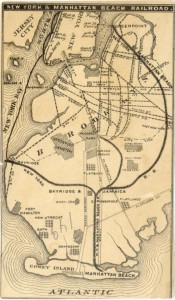Back in the day robber barons did as they pleased and let you know that they held all the cards. Case in point: financier Austin Corbin, who was the money behind the building of Coney Island and consolidating the Long Island Railroad. He stole land from Native Americans and barred Jewish people from his hotels, but he didn’t lose any sleep over it. Corbin, who resided in Babylon, Long Island, also annoyed the nine-to-fivers by having his own private train car attached each day to the head of the commuter train, so that he didn’t have to ride with the hoi polloi. Sometimes this caused delays to occur and tempers to flare. The Brooklyn Daily Eagle had a story about such an occurrence in its June 8, 1891 issue. The coda below that story is from the June 5, 1896 New York Times, an article about a day Corbin didn’t–but should have–traveled by train.
••••••••••
“Grumbling at Austin Corbin” (Brooklyn Daily Eagle, 1891): “There was an array of ‘kickers’ on the Patchogue express train for New York this morning. The ‘kickers’ were business men, mechanics, brokers, lawyers and others. ‘Is this railroad run for the personal convenience of Austin Corbin or the public who support it?’ was the question that ran through the parlor cars and coaches before and after the train had left Babylon. The reason for the feeling of complaint was that the train was eight minutes late. The time had been lost at Babylon in coupling on the private car of Mr. Austin Corbin. Mr. Corbin always has his private car, which is the handsomest one on wheels to-day, run at the head of the train so as to avoid taking the dust that would make riding unpleasant were the car hitched to the rear of the train. The eight minutes’ loss of headway was a serious matter in the minds of the business men who were passengers, as those of them who were heading for New York feared that it would lose them a boat, and the loss of a James slip boat means the loss of a half hour, and the loss of a Thirty-fourth street boat entails a loss of ten minutes. Beside, the passengers for Brooklyn were delayed, and on the Atlantic division there is no chance to make up time, for the management of the rapid transit trains puts them directly in front of a belated through train and not much time is lost. The protestants against the loss of time were very much placated upon reaching Hunter’s Point when they found that the train had made up four minutes of time and that the ferryboats had been held back for the train.”
••••••••••
“Austin Corbin Dead: Thrown Out of His Carriage at Newport, New Hampshire, Suffers Severely a Portion of the Time from His Injuries, Leg Broken and Head Badly Cut, His Scalp Laid Bare with Two Great Gashes and His Lips and Chin Frightfully Lacerated” (New York Times, 1896): “Austin Corbin died here this evening at 9:42 o’clock of injuries received by being thrown from a carriage. John Stokes, the coachman, also received fatal injuries and died at 6 o’clock.
Corbin Edgell, nephew of Mr. Corbin, and Dr. Paul Kunzler, the other occupants of the carriage, were injured severely. Mr. Edgell’s right leg is broken in two places between the knee and ankle. Dr. Kunzler has a broken arm and sprained ankle.

That odious anti-semite Austin Corbin stated in a 1879 interview, “Personally, I am opposed to the Jews.” He banned all Jewish people from his hotel, including the Manhattan Beach Hotel (pictured).
The accident took place at 3 o’clock this afternoon, when the party started from Mr. Corbin’s country house on a fishing trip. They rode in an open carriage drawn by a pair of horses which the coachman, Stokes, was driving. Just as they were moving out of the yard, the horses, which were being driven without blinders for the first time, shied, and all the occupants were thrown down an embankment against a stone wall.
Mr. Corbin’s injuries seemed to be very severe. It is supposed that the injuries that caused Mr. Corbin’s death were those of which the outward marks were two great cuts in the forehead. On the front of his head there was a cut fully four inches long, which laid bare his scalp; on the right side of the head was another cut three inches long. Mr. Corbin’s face was also cut and torn, particularly his chin and lips.
He was conscious when taken from the ground, and retained consciousness for a long time. Everything possible was done to alleviate his suffering, but his injuries were of such a nature that necessarily he experienced a great deal of pain.”


